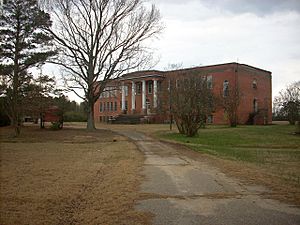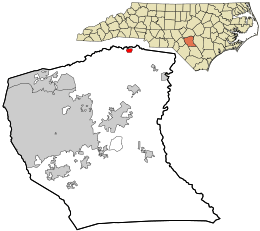Linden, North Carolina facts for kids
Quick facts for kids
Linden, North Carolina
|
|
|---|---|

The long-since closed Linden School
|
|

Location in Cumberland County and the state of North Carolina.
|
|
| Country | United States |
| State | North Carolina |
| County | Cumberland |
| Area | |
| • Total | 0.55 sq mi (1.42 km2) |
| • Land | 0.55 sq mi (1.42 km2) |
| • Water | 0.00 sq mi (0.00 km2) |
| Elevation | 118 ft (36 m) |
| Population
(2020)
|
|
| • Total | 136 |
| • Density | 247.27/sq mi (95.54/km2) |
| Time zone | UTC-5 (Eastern (EST)) |
| • Summer (DST) | UTC-4 (EDT) |
| ZIP code |
28356
|
| Area codes | 910, 472 |
| FIPS code | 37-38360 |
| GNIS feature ID | 2406023 |
Linden is a small town in Cumberland County, North Carolina, United States. In 2010, the town had a population of 130 people. The current mayor of Linden is Frances Collier.
Contents
History of Linden: Important Buildings and New Temples
Several historic buildings in Linden are listed on the National Register of Historic Places. This means they are important places that are kept safe and recognized for their history. These include Ellerslie, Ivy Burne, and the Dr. Wayman C. Melvin House.
In 2020, a group called the Asatru Folk Assembly (AFA) bought an old church in Linden. They turned it into a special building for their religion. This religion is a modern form of Heathenry, which is inspired by the beliefs of the ancient Viking people. Their temple is named "Thorshof," which means "Thor's temple" in Old Norse, the language the Vikings spoke. It is dedicated to the Viking god Thor.
Geography of Linden: Where is it Located?
Linden is found in the northeastern part of Cumberland County. A small part of its northern border reaches into Harnett County. The Little River, which flows into the Cape Fear River, forms the southern border of Harnett County here.
North Carolina Highway 217 runs through Linden. It is known as Linden Road and Mill Road in town. This highway can take you about 7 miles northeast to Erwin. If you go west for about 2 miles, you will reach U.S. Route 401. From Linden, you can travel southwest on US 401 for about 18 miles to get to Fayetteville. Fayetteville is the main city and county seat of Cumberland County.
The United States Census Bureau says that Linden covers a total area of about 1.3 square kilometers (0.5 square miles). All of this area is land.
Demographics: Who Lives in Linden?
| Historical population | |||
|---|---|---|---|
| Census | Pop. | %± | |
| 1920 | 191 | — | |
| 1930 | 174 | −8.9% | |
| 1940 | 224 | 28.7% | |
| 1950 | 194 | −13.4% | |
| 1960 | 157 | −19.1% | |
| 1970 | 205 | 30.6% | |
| 1980 | 365 | 78.0% | |
| 1990 | 180 | −50.7% | |
| 2000 | 127 | −29.4% | |
| 2010 | 130 | 2.4% | |
| 2020 | 136 | 4.6% | |
| U.S. Decennial Census | |||
According to the census from the year 2000, there were 127 people living in Linden. These people made up 51 households and 39 families.
About 21.6% of the households had children under 18 years old living with them. Most households, 54.9%, were married couples living together. About 17.6% of all households were made up of people living alone.
The population was spread out by age. About 20.5% of the people were under 18 years old. About 18.1% were 65 years of age or older. The average age of people in Linden was 44 years old.
See also
 In Spanish: Linden (Carolina del Norte) para niños
In Spanish: Linden (Carolina del Norte) para niños

